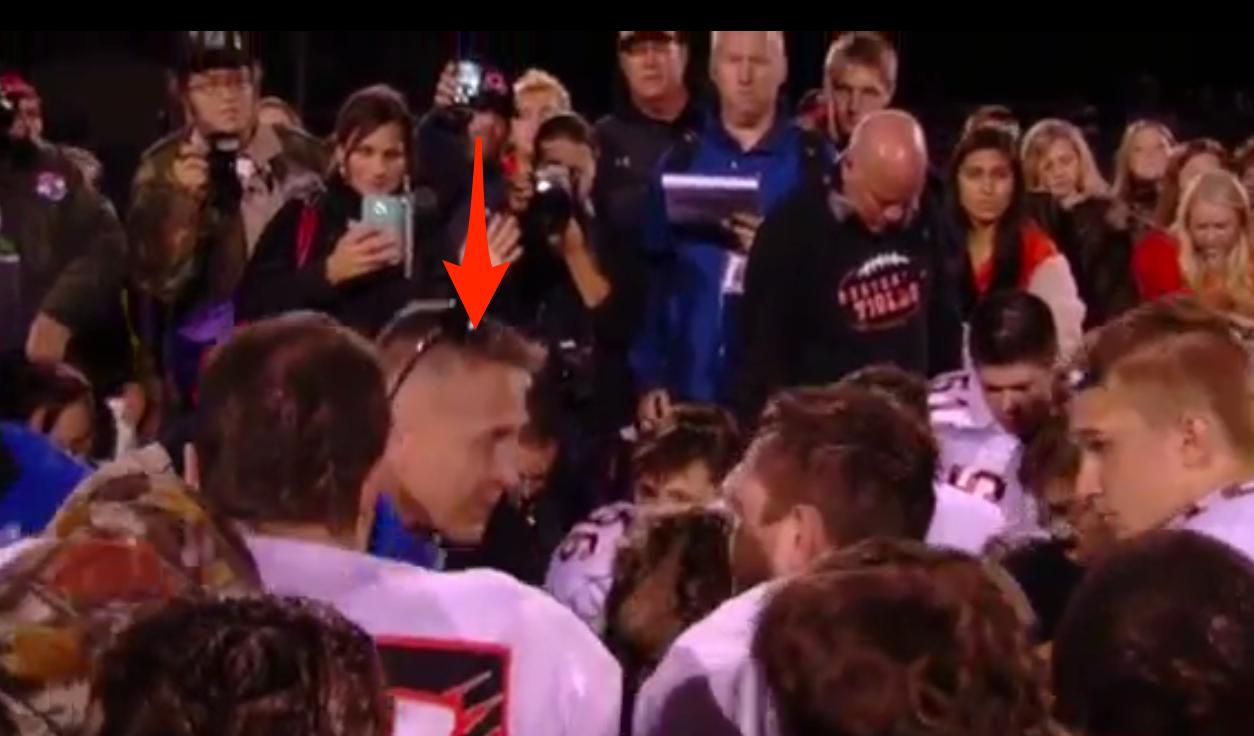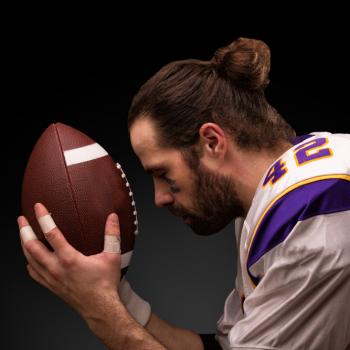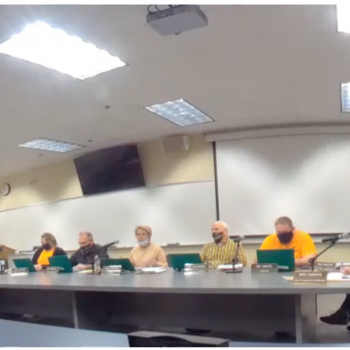Once again, a public school football coach who wouldn’t stop praying on the field and was subsequently fired has lost a major court battle. Church/state separation won over misleading claims of “religious freedom.”

In order to make sense of today’s ruling, there’s a lot of backstory to get through, but it’s worth exploring if you’re curious about how these issues play out in real time.
The case involved Joe Kennedy, the former assistant football coach at Bremerton High School in Washington. In 2015, he continued praying publicly despite several warnings that he was violating the law. That December, the District said they wouldn’t be renewing his contract, which led to him filing a federal lawsuit against them in August of 2016. A federal district court judge refused to overturn the District’s decision. So Kennedy’s lawyers from First Liberty appealed the decision, and in August of 2017, the Ninth Circuit Court of Appeals ruled against him too.
So Kennedy tried again, asking the entire Ninth Circuit to give his case another look. They declined in January of 2018. That June, his lawyers threw the Hail Mary pass, asking the Supreme Court to reconsider his appeal.
The Supreme Court declined to take up his case — thank goodness — but four of the conservative justices (everyone except Chief Justice John Roberts) issued an explanation of why they weren’t taking up this case.
In short, they felt there were too many “important unresolved factual questions” that would make it “difficult if not impossible” to decide the case.
Their main concern hinged on the question of whether his firing violated his free speech rights.
The District said they fired him over the prayers because (1) he wasn’t supervising his players at the time like he was supposed to and (2) reasonable observers might think his prayers represented school-sponsored religion. Justice Samuel Alito wrote for the conservatives that the first concern would be a legitimate one for the District, and Kennedy had no proof he was off-duty at those times:
… [Kennedy’s] free speech claim would have far greater weight if petitioner was likely to be able to establish either that he was not really on duty at the time in question or that he was on duty only in the sense that his workday had not ended and that his prayer took place at a time when it would have been permissible for him to engage briefly in other private conduct, say, calling home or making a reservation for dinner at a local restaurant.
Unfortunately, the District Court’s brief, informal oral decision did not make any clear finding about what petitioner was likely to be able to prove.
Alito added that the four justices would gladly have overturned the earlier ruling if the facts supported Kennedy, but those facts just weren’t there. Literally, they weren’t there. It’s not that the facts went against him. So they had nothing to point to in order to say the District was wrong.
Alito also hinted that another case could help the conservatives tear down the wall between church and state because the “Ninth Circuit’s understanding of the free speech rights of public school teachers is troubling and may justify review in the future.”
According to the Ninth Circuit, public school teachers and coaches may be fired if they engage in any expression that the school does not like while they are on duty, and the Ninth Circuit appears to regard teachers and coaches as being on duty at all times from the moment they report for work to the moment they depart, provided that they are within the eyesight of students. Under this interpretation of Garcetti, if teachers are visible to a student while eating lunch, they can be ordered not to engage in any “demonstrative” conduct of a religious nature, such as folding their hands or bowing their heads in prayer. And a school could also regulate what teachers do during a period when they are not teaching by preventing them from reading things that might be spotted by students or saying things that might be overheard.
You didn’t have to be a lawyer to understand how misguided that passage was. No church/state separation group has ever said teachers should be punished for private expressions of faith, even within the sight of students. You won’t see the Freedom From Religion Foundation filing a lawsuit over a teacher who quietly prays during recess. Those groups only take action when the teacher pressures kids to join in. That’s what coaches do when they participate in prayers. That’s what administrators do if they pray over the loudspeaker. But the conservatives on the Supreme Court were suggesting liberals would balk at any sighting of a public school staffer doing something religious during the work day.
It was a completely misleading interpretation of the law.
Alito finished his statement by mentioning that the Court wouldn’t hear Kennedy’s case on Free Speech grounds, but they could theoretically hear it “under the Free Exercise Clause of the First Amendment and Title VII of the Civil Rights Act of 1964.” But for now, the question in front of them regarded Free Speech, and on those grounds alone, the Court couldn’t take up his case.
So Kennedy and his legal team tried again. This time, they were trying to make clear all the facts of the case so that SCOTUS couldn’t say those matters were unresolved.
Last March, U.S. District Court Judge Ronald B. Leighton shot down an attempt at summary judgment in Kennedy’s favor. That was good news for church/state separation. It meant the “facts” his side were trying to establish were in doubt.
For example, was Kennedy on or off the clock when he was praying on the field? That would be the difference between legal private prayers and illegal public ones. The judge said:
… while this case exists near the crossroads of these concerns, Kennedy’s prominent, habitual prayer is not the kind of private speech that is beyond school control… Given this practical assessment of Kennedy’s duties as a coach, the Court must hold that his prayers at the 50-yard line were not constitutionally protected.
…
… Like the front of a classroom or the center of a stage, the 50-yard line of a football field is an expressive focal point from which school-sanctioned communications regularly emanate. If a teacher lingers at the front of the classroom following a lesson, or a director takes center stage after a performance, a reasonable onlooker would interpret their speech from that location as an extension of the school-sanctioned speech just before it. The same is true for Kennedy’s prayer from the 50-yard line.
Was the District within its rights to fire him? Again, the judge said yes because they had good reason to be concerned. Just look at what the court said about the coercive factor of his prayers:
… even more than the perception of school endorsement, the greatest threat posed by Kennedy’s prayer is its potential to subtly coerce the behavior of students attending games voluntarily or by requirement. Players (sometimes via parents) reported feeling compelled to join Kennedy in prayer to stay connected with the team or ensure playing time, and there is no evidence of athletes praying in Kennedy’s absence.
It’s exactly what atheists had been saying all along when it came to why public school coaches shouldn’t be leading or participating in prayers with students.
Did the District violate his First Amendment rights? Nope, said the judge.
The District gave Kennedy multiple options to continue praying after games that would not have amounted to a violation. Kennedy, however, rejected these accommodations and did not respond to the District’s requests for further input. In light of this, Kennedy’s Free Exercise claim cannot succeed.
Was his firing the result of religious discrimination? Nope.
… There is no evidence that Kennedy’s religion itself, rather than the unconstitutional time and manner he expressed it, motivated the District’s actions. All the evidence shows that the District wanted to accommodate Kennedy’s faith and encouraged constitutional religious expression.
…
… the District had a legitimate, non-discriminatory reason for placing Kennedy on leave: avoiding a constitutional violation. The undisputed evidence demonstrates that this was the District’s rationale, and Kennedy presents no evidence that the District’s actions were merely pretext to punish him for his religion.
It was just a complete shutdown of every argument Kennedy and his Christian allies were claiming.
But because conservative Christians can’t admit they’re not being persecuted, his side appealed again.
Today, the Ninth Circuit once again shot down his claims in a unanimous decision agreeing with the district court. Here’s Judge Milan D. Smith Jr.:
Although there are numerous close cases chronicled in the Supreme Court’s and our current Establishment Clause caselaw, this case is not one of them…
…
Kennedy’s attempts to draw nationwide attention to his challenge to BSD compels the conclusion that he was not engaging in private prayer, but was instead engaging in public speech of an overtly religious nature while performing his job duties. BSD tried to reach an accommodation for Kennedy, but that was spurned by his insisting that he be allowed to pray immediately after the conclusion of each game, likely surrounded by students who felt pressured to join him.
There’s also this telling footnote from the judges calling out Kennedy’s lawyers for selectively asking them which pieces of evidence to accept and which to ignore:
Such a myopic view of the events leading to litigation simply does not tell the whole story — like attempting to decipher the plot of “The Wizard of Oz” by viewing a still photograph of Dorothy awaking in her bed at the end of the film.
Americans United for Separation of Church and State applauded today’s ruling:
Americans United Vice President and Legal Director Richard B. Katskee participated in oral arguments on Jan. 25 in support of the school district. AU, joined by 17 other religious freedom and interfaith organizations, also filed an amicus brief with the court.
Katskee issued the following statement in response to today’s opinion:
“Public schools must provide an inclusive and welcoming environment for all students, regardless of their religious beliefs. That includes ensuring that student athletes don’t feel compelled to pray or participate in religious activities to secure their place on a team.
“Americans United argued, and the court agreed, that the Bremerton School District did the right thing: It protected the religious freedom of all the students and their families. Americans United was proud to support the district’s efforts.”
As we’ve said before, Kennedy always had the right to pray. What he was doing was making a giant spectacle of it in a way that was overt and coercive. When even the Supreme Court, with its conservative majority, says you’ve gone too far, it’s time to give up and accept that you’re the problem, not the school officials who respect the Constitution and are looking out for the best interest of students.
(Large portions of this article were published earlier)




It’s Moving Day for the Friendly ..."
It’s Moving Day for the Friendly ..."
It’s Moving Day for the Friendly ..."
It’s Moving Day for the Friendly ..."